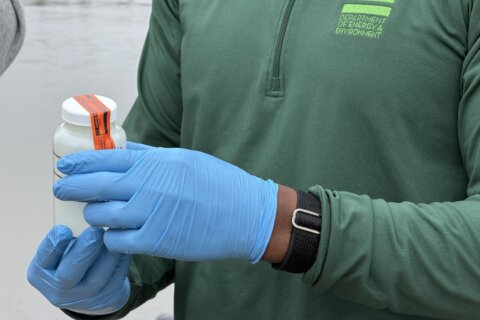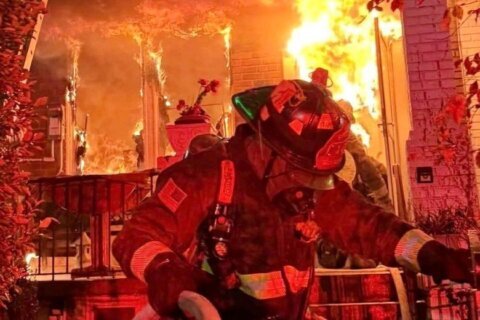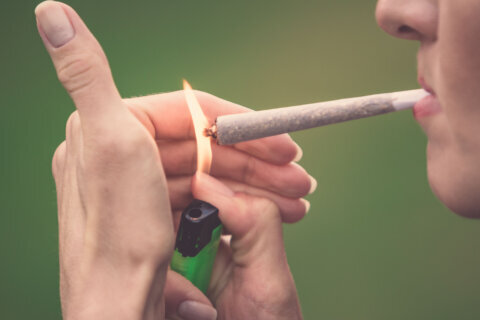The first presumptive positive case of coronavirus infection has been confirmed in D.C., the mayor’s office announced late on March 7.
In a news conference just after 8 p.m. Saturday, Mayor Muriel Bowser said a D.C. resident in his 50s exhibited symptoms of a respiratory virus in late February. He was admitted to a hospital in the District on March 5.
He had no history of recent international travel, nor had he been exposed to anyone with a confirmed case of coronavirus.
“With his test yielding presumptive positive, D.C. Health has started its investigation in keeping with CDC guidelines,” Bowser said. The investigation includes tracing the man’s movements, though the mayor declined to say where in D.C. the man lived.
Bowser and other administration members reminded residents to make their best efforts to prevent the spread of germs in the District.
There have been 11 potential cases of coronavirus in D.C. Bowser said nine people have produced negative tests, one is pending and the first presumed positive case was known earlier Saturday.
D.C.’s first presumptive positive for the coronavirus is a 50-year-old man with no history of international travel and no known prior contact with an infected person. Mayor Bowser says he started showing symptoms in late Feb. pic.twitter.com/Q1XEeRSQBq
— Alejandro Alvarez (@aletweetsnews) March 8, 2020
The mayor said D.C. is also aware of people who have traveled to the city and then presented themselves with symptoms similar to COVID-19 while in other states.
Bowser said the District will not yet need to declare a state of emergency, since as the mayor, she has more ability to direct money and resources than a state governor does.
When asked about her response to the recent news that the South by Southwest events in Texas had been canceled, and whether she planned to cancel any activities in D.C., Bowser said “we are not canceling any events the District is sponsoring at this stage.”
The annual Cherry Blossom Festival starts on March 20 and draws thousands of tourists.
Also at the news conference was Dr. Anjali Talwalkar, the Senior Deputy Director of D.C. Health. Talwalkar. Talwalkar explained that D.C. is working to assess the cases of the people who came into the city and then presented elsewhere.
Dr. Jennifer Smith, of the District’s Forensic Sciences lab, said D.C. can test about 50 patients per day.
Talwalkar explained how the decision is made as to do a coronavirus test, noting that DC Health works with the patient’s health care provider and takes into consideration the CDC’s guidelines before using a test. Smith noted the District currently has about 1,500 test kits available.
“This is as much art as it is science,” Talwalkar said. “We do case-by-case consultations and decisions as well as we get information from the health care providers and patients.”
Bowser noted “the Department of Health always has the discretion to implement what’s best for the District. … I will be very sure that our health department has checked and double-checked to make sure that we’re making the test available to everyone who meets the guidelines. But if there are special circumstances that present, they will get a hard look from us.”
Maryland reported that a person confirmed to have coronavirus attended the Conservative Political Action Conference (CPAC) at the Gaylord Resort and Conference Center in National Harbor from February 27 to March 1, according to the New Jersey Department of Health.
Virginia also recorded its first case Saturday when a U.S. Marine stationed at Fort Belvoir was found to have the virus.
Regarding coronavirus exposure at CPAC, the Maryland Department of Health and the Governor’s Office are coordinating with the Centers for Disease Control and White House, as well as the U.S. Department of Health and Human Services.
“Due to the scale of this conference, we are urging attendees who are experiencing flu-like symptoms to immediately reach out to their health care provider,” said Maryland Gov. Larry Hogan in a statement. “We are providing this update not to unnecessarily raise alarm, but in the interest of full transparency and out of an abundance of caution.”
This follows three cases confirmed in Maryland on March 5, resulting in Gov. Hogan declaring a state of emergency.
MDH recommends that members of the public who attended this event monitor themselves for symptoms of a respiratory infection including fever, cough, and shortness of breath.
CPAC attendees should check their temperature twice a day and notify their health care provider and local health department if their temperature exceeds 100.4 degrees or if they develop a respiratory illness, and remain at home until given further instructions from health authorities.
Check out WTOP’s coronavirus FAQs for more information on COVID-19.
The Associated Press contributed to this report.









